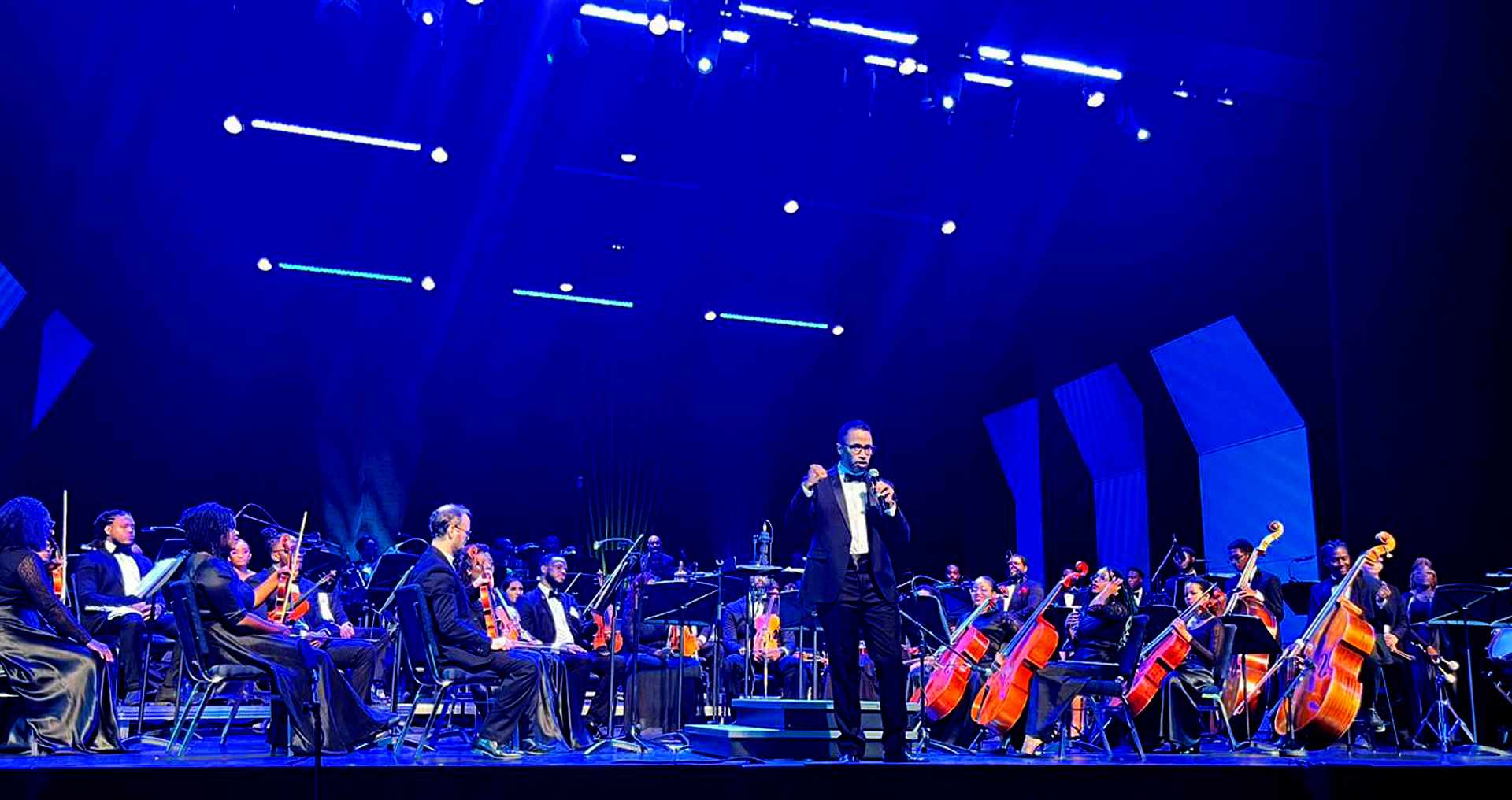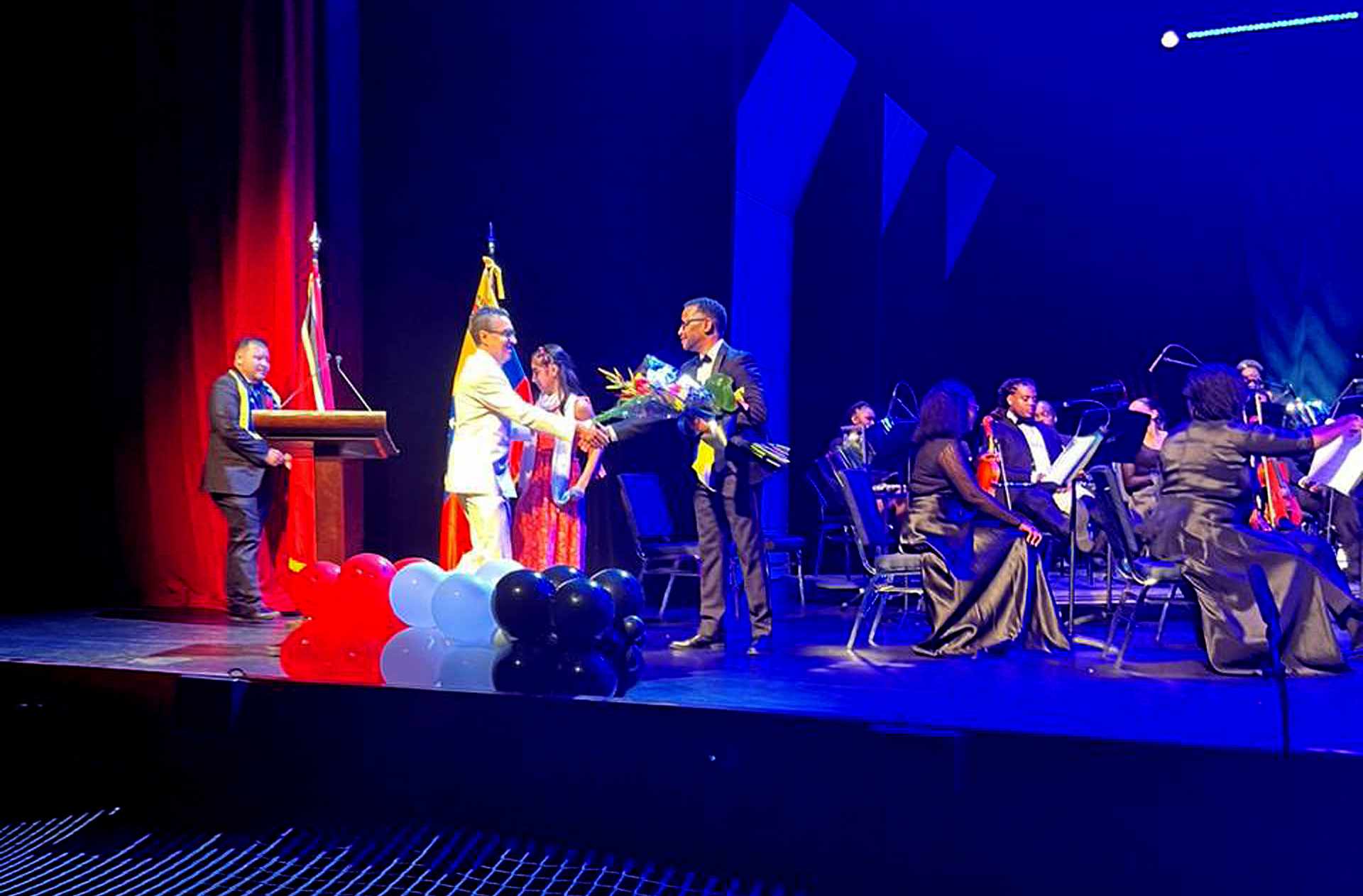The Blending of Cultures - Our Latin Connection
By: David Boothman
September 23, 2023

There is a sense of romantic alchemy when music moves from its familiar cultural moorings and enters into a wholly new experience of transcendental bliss. Think of the sound of pan migrating away from its familiar environs and mingling, in textures, with the conventional instruments of a traditional orchestra. Suddenly, the seductive notes of the pan are heard as the blissful sound of rain drizzling, the nuance and subtlety a world away from the density of sound that we’re used to, now transported to the visual imagination. The alchemy of sound between the conductor, the bandmaster and the musicians rises, unified, to become one. The idea of a Caribbean Renaissance suddenly suggests itself to me and the alchemy onstage has opened Pandora’s box for this writer, releasing in my mind, or is it my heart, the possibilities on our horizon for a Caribbean Renaissance ‘classical’ music.
The concert of which I speak took place last Thursday September 14th at our state of the art concert hall, the National Academy for the performing Arts (NAPA). The particular event was the 61st Anniversary of diplomatic Bilateral Relations Trinidad and Tobago and Venezuela. The Embassy of the Bolivarian Republic of Venezuela, under the auspices of His Excellency Ambassador Álvaro Sánchez Cordero, and the National Philharmonic Orchestra of Trinidad & Tobago produced this magical cultural concert. It was amazing. The musical selection celebrated the close bond of the two countries’ respective cultural heritages. The collaboration between Dr Roger Henry Director, conductor of the National Philharmonic Orchestra of T&T and Ambassador Cordero gave the population an entrée into the music of composers Pablo Herrero and Jose Luis Armeneros, Refael Delgado, Juan Vicente Torrealba and Simon Diaz, all from Venezuela. The Trinidadian contribution, although not meaning ‘to be boasty’, featured compositions by Lionel Belasco, Winston Des Vignes, Kes Dieffenthaller and Roger Henry. The combined music was a feast of songs from a variety of root genres: Castilian, Latin, folk, Calypso and Soca.

The performance was flawless and segued between the different styles and themes, exploring the unbelievably rich, indigenous folk polyrhythms which, ultimately, connect the two cultures. Credit has also to be given all the dedicated hard working musicians and to the UTT Academy of the Performing Arts - APA Percussion Ensemble who were included in the mix.
When we describe music as ‘classical’, most assume that it is European. But that is to pre-empt what is noble as belonging wholly to Europe. Not so! The Caribbean Renaissance thinking debunks this assumption and sees very notion as part of the intrinsic process of decolonisation. Our imaginations have become too accepting of tutored and learned assumptions, too passive and, even, lazy.
The statement highlights the importance of challenging assumptions that equate classical music exclusively with European culture and suggests that such assumptions may reflect notions of imported cultural superiority and our own inferiority. Embracing a more inclusive and global perspective on classical traditions and music can lead to a more profound appreciation of the diversity and depth of human musical achievements throughout history. It's essential to recognise and celebrate the various classical traditions from around the world, acknowledging their unique contributions to the global cultural heritage.
In commemorating this important milestone (61years of diplomatic Bilateral Relations between Trinidad and Tobago and Venezuela), Ambassador Cordero’s introductory presentation was enlightening and riveting. He opened in the most expansive way:
“Today, we all come together to pay tribute to the union, solidarity, integration and cooperation that has existed between both of our countries during the past six decades”. He continued: “In celebrating today in such a grand way, the 61st Anniversary of Bilateral Relations with Trinidad and Tobago. We are confident that our geographical proximity – which has gifted us with such an abundant wealth of human and cultural connection – may indeed pave the way for further integration and cooperation in strategic areas, such as energy, agriculture, transport, trade and commerce and science and technology, where we have incredible potential.”
A diplomat who possesses a deep understanding of history and it’s interconnectedness of human culture - connecting the dots of their predecessors in solidarity of regional integration and decolonisation construct, is an enlightened and caring one.
Ambassador Cordero also reminded the audience that:
“Trinidad was key to the achievement of Venezuelan independence in 1811. The Forerunner of our Independence, Francisco De Miranda, found refuge in Trinidad in the first decade of the 19th Century, and it was from Trinidad that De Miranda left for La Vela de Coro in 1806 to hoist our Venezuelan flag for the first time on Venezuelan soil. Equally, the inauguration of our Second Republic in 1813 was planned and organized by Santiago Mariño and the Immortal 45 from Chacachacare Island, here in Trinidad. We are therefore historically indebted to Trinidad and Tobago."
In terms of culture, both Trinidad and Tobago and Venezuela have enriched one another through ancestry, heritage and knowledge of each other. In the early 19th Century, Venezuelan cocoa farmers arrived in Trinidad bringing a most important part of our cultural identity with them. Of course, this includes Parang music. Also, towards the end of the 19th Century, Trinidadians migrated to Venezuela to work in the mining industry and they carried with them carnival celebrations and calypso music, especially to the town of El Callao in the state of Bolivar. A cultural event was recently held at NALIS, where Venezuela’s own Calypso Day was celebrated.
As a matter of fact, the Ambassador added:
"in today’s concert, we shall indeed appreciate some of this Trinbagonian and Venezuelan mixture of cultural musicality. It will be remiss of me not to mention the significant contribution by the Venezuelan Institute for Culture and Cooperation (the IVCC), which just celebrated its 60th Anniversary in April of this year; thus, becoming a key reference in terms of cultural enhancement between both of our countries”.
For the reader’s information, the writer has added below, a little history of, both, the geographic and historical proximity the two countries:
- The Orinoco River flows through the northern part of Venezuela, and its delta region empties into the Caribbean Sea, very close to the northern coast of Trinidad. This geographical proximity has historically facilitated various forms of interaction between the two regions. The Orinoco River has served as a vital waterway for trade and transportation between Trinidad and Venezuela. Goods, including agricultural products, minerals, and other commodities, have been transported along the river and its tributaries to ports on the Venezuelan coast, from where they can be shipped to Trinidad and other international destinations. The close proximity of Trinidad and the Venezuelan coast has also led to cultural exchange between the two regions. People from both sides of the Orinoco have shared cultural elements, including music, cuisine, and traditions. This exchange has contributed to the rich cultural diversity found in both areas.
- Our National Philharmonic Orchestra of Trinidad & Tobago laid the musical canvas for cultural palette for the evening. Their selected repertoire and arrangements of the Venezuelan and Trinbago’s compositions to use a local expression was the “bomb”.
- The compositions of Pablo Herrero and Jose Luis Armenteros’s “Venezuela” to Lionel Belasco’s “Venezuela” and Palms of Maracaibo arranged by Simon Browne to “Woman Del Callao”, “Analica”, “Desilusión”, “Caballo Vejo” by other Venezuelan composers laid the intricate fine quilt of latin tincture. Then there was the nostalgic of the familiar - Winston’s Devine’s “Progress” arranged by Dr Roger Henry, Kes Dieffenthaller’s “Savannah Grass” arranged by Wasia Ward Roger Henry’s Symphony2: Dance, Tan tan, Movement 1: Fanfare, and Movement 5: Jam. The audience was swept and taken on Caribbean Renaissance ride... a romantic alchemy at play.
- A little note on Lionel Belasco 1881 - 1967. He was born in Trinidad and Tobago but later moved to Venezuela. He was a pianist, and bandleader known for his contributions to calypso as a composer and arranger and the early development of steelpan music. Belasco's music was deeply rooted in Trinidadian and Venezuelan traditions. He incorporated elements of Calypso, and Venezuelan folk music into his compositions. His influence can be seen in the way of his musical organisation and leadership shaping the early calypso genre, which later evolved into various forms of Caribbean music. There is, of course, more to be said in the exploration of our Latin-Caribbean blending of histories, identities and, of course, the day to day realities in the ongoing process of decolonisation.